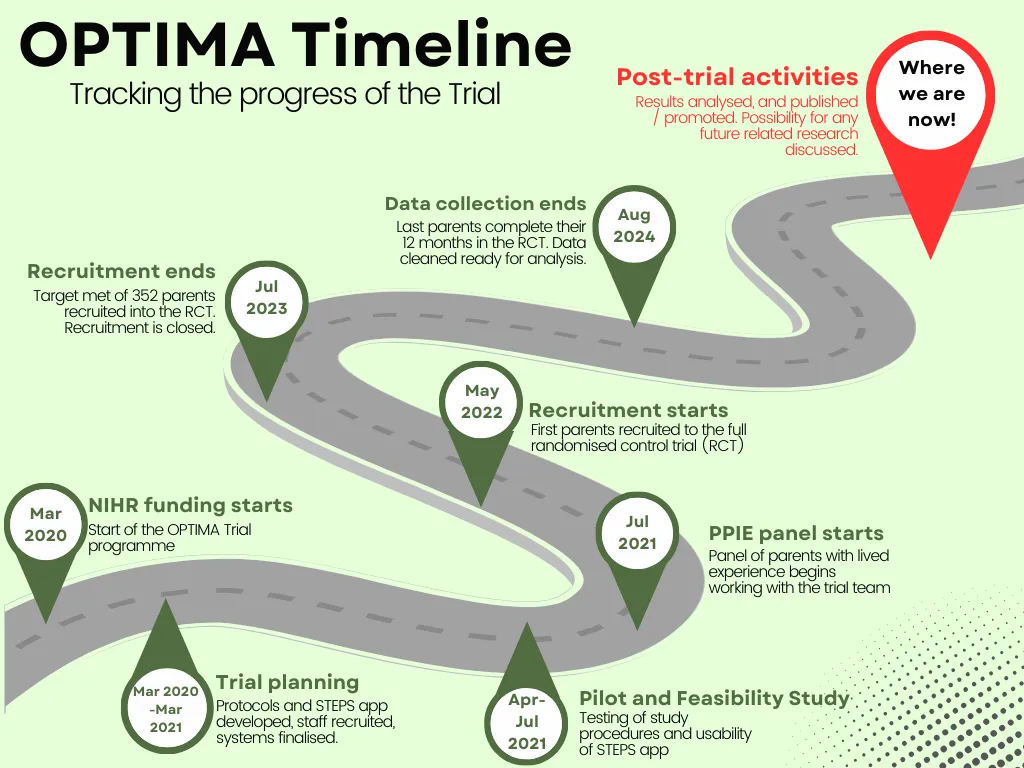Online Parent Training for the Initial Management of ADHD referral (OPTIMA) trial and the STEPS app
Please note: the key component of this programme was a randomised controlled trial that tested the STEPS app compared to the waitlist control – OPTIMA recruitment has now finished.
Many children referred to mental health services struggle with their behaviour, which can be very difficult for parents. Timely access to advice and support for families who face these kinds of challenges is crucial. Yet, this is usually delivered face-to-face and only after a full clinical assessment.
Families waiting for this assessment often face long delays with little or no support, which can make the difficulties they are experiencing even harder. We developed a new app, called STEPS, to bridge this gap in support and evaluated it as part of the OPTIMA programme of research.
OPTIMA is organised by King’s College London and the universities of Nottingham and Southampton, in consultation with a group of parents of neurodiverse children and is funded by the National Institute for Health Research. It tested whether STEPS could help families of children who show challenging behaviour that is linked to attention deficit hyperactivity disorder (ADHD).
STEPS does not replace clinical support but gives parents access to additional help while they are waiting for a full clinical assessment. We hope that STEPS will allow many more parents to quickly access vital parenting support.

OPTIMA Timeline
- March 2020: NIHR funding starts. Start of the OPTIMA Trial programme
- March 2020-March 2021: Trial planning. Protocols and STEPS app developed, staff recruited, systems are finalised.
- April 2021-July 2021: Pilot and Feasibility Study. Test of study procedures and usability of STEPS app.
- July 2021: Patient and Public Involvement and Engagement starts. Panel of parents with lived experience begins working with the trial team.
- May 2022: Recruitment starts. First parents recruited to the full randomised control trial (RCT).
- July 2023: Recruitment ends. Target met of 352 parents recruited into the RCT.
- August 2024: Data collection ends. Last parents complete their 12 months in the RCT. Data cleaned and ready for analysis.
- Where we are now: Post-trial activities. Results analysed and published. Possibility for any future-related research discussed.
What is the STEPS (Structured E-Parenting Support) app?
STEPS is a parenting support programme, delivered as a mobile phone app. Designed for parents of primary-aged children with ADHD-related behaviours, STEPS provides evidence-based information and practical tools. Unlike some traditional parenting programmes, STEPS is unguided, which means there is no personal clinical support. Instead, it draws on years of research and clinical experience and has been carefully tested by parents to ensure it is both accessible and useful.
Because STEPS is a mobile app, it can be used anywhere and at any time, and can be delivered at a low cost to families seeking help, such as those awaiting clinical assessment for their child. STEPS works on most smartphones and is easy to download.
The app is inspired by the New Forest Parenting Programme – a face-to-face parent training programme which has been shown to have a positive impact on child outcomes. The STEPS app does not replace clinical support, but it gives parents access to additional help while they are waiting for an assessment.
In a usability study, parents described STEPS as easy to navigate, visually attractive, and well-designed. They found the content useful, pitched at the right level, and presented in a sensitive and supportive way. You can read more about the usability study online.
Structure and Content
STEPS features eight modules that parents can move through at their own pace and in their own time. It takes about 20 minutes to complete each module, and more content is unlocked progressively, as parents move throughout the app. Most of the content is delivered via bite-sized videos and audio clips, narrated by a buddy (a parent played by an actor).
The app also includes downloadable resources and space to record personal reflections. Parents can favourite any content in the app to refer to later. With input from the OPTIMA parent panel, watch the short animation about the STEPS app.
To read more about why and how the animation was developed, read the blog post (archived from the Web Archive).
Who funded the study?
The OPTIMA research programme is funded by the National Institute for Health Research (NIHR) Programme Grants for Applied Research (RP-PG-0618-20003) awarded to Professor Sonuga-Barke (Chief Investigator) and colleagues.
Who are our key partners?
OPTIMA was developed and delivered by King’s College London and the universities of Nottingham and Southampton. STEPS visual design and digital implementation was completed by TOAD, with funding provided to Professor Edmund Sonuga-Barke by the South London & Maudsley NHS Trust. Videos were produced by Eyewitness Productions Ltd and funded by the Solent NHS Trust.
Parents of children who were on the waiting list in these listed child mental health services were invited to take part in OPTIMA. We thank the services for their support.
South London and Maudsley NHS Foundation Trust, including:
- Croydon CAMHS
- Lambeth CAMHS
- Lewisham CAMHS
- Southwark CAMHS
Other CAMHS services:
- CAMHS Southampton
- CAMHS Portsmouth
- Gloucestershire Health and Care NHS Foundation Trust CAMHS
- North East London NHS Foundation Trust CAMHS
- Nottingham City Council Behavioural and Emotional Health Team
- South West London and St George’s Mental Health Trust CAMHS
Publications
Publications, blog posts, newsletters and resources can found in the 'Outputs' tab below.

Principal Investigator
Affiliations
Contact us
Want to get in touch with our research team?
For more information on the OPTIMA study or STEPS app, please contact Nancy Lean (King's College London) or Ellen Hedstrom (University of Southampton).
Follow us on social media:
- X: @ExPANDKCL

